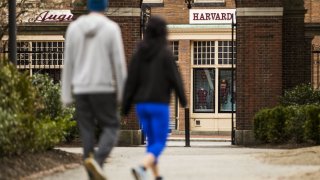
- The Supreme Court agreed to take up two cases challenging college admission policies that consider the race of student applicants.
- The lawsuits against Harvard University and the University of North Carolina argue that the admissions policies engage in "racial balancing" and discriminate against Asian-American applicants.
- The Supreme Court in an order list combined the two cases, which were both brought by the group Students for Fair Admissions, and allotted one hour for oral argumen
The Supreme Court on Monday agreed to take up two cases challenging college admission policies that consider the race of student applicants, potentially imperiling the divisive programs that have been narrowly upheld for decades.
The lawsuits against Harvard University and the University of North Carolina argue that the admissions policies engage in "racial balancing" and discriminate against Asian-American applicants. Lower courts sided with Harvard and UNC, who argue that including race as one of many factors in the applicant-review process is a necessary part of fostering student-body diversity.
The Supreme Court in an order list combined the two cases, which were both brought by the group Students for Fair Admissions, and allotted one hour for oral argument.
Get top local stories in DFW delivered to you every morning. >Sign up for NBC DFW's News Headlines newsletter.
The high court's 6-3 conservative majority could potentially weaken or eliminate the use of race-conscious admissions policies, which in past cases have been upheld mostly by liberal-leaning justices.
In 2016, for instance, the court narrowly voted to allow an affirmative action program at the University of Texas at Austin to continue. Then-Justice Anthony Kennedy joined the court's liberals, including the late Ruth Bader Ginsburg, in the majority. Conservative Justice Clarence Thomas in a dissent argued the policy "rests on pernicious assumptions about race, and departs from many of our precedents."
The current lawsuits against Harvard and UNC want the court to overturn a 2003 ruling, in which then-Justice Sandra Day O'Connor wrote for a 5-4 majority that the University of Michigan Law School's consideration of race in admissions "does not unduly harm nonminority applicants."
Money Report
The Fourteenth Amendment to the Constitution and Title VI of the Civil Rights Act both preclude the use of race in admissions programs, Students for Fair Admissions argues.
"At Harvard, race is not a 'temporary' evil to be repealed as soon as possible; it is a key aspect of identity that Harvard will use until a court makes it stop," the group wrote last year in its request for the Supreme Court to take up the case.
In its reply brief, Harvard denied discriminating against Asian-American applicants, and argued that it "does not automatically award race-based tips but rather considers race only in a flexible and nonmechanical way."
Federal district court judges had previously ruled in the universities' favor. The U.S. Court of Appeals for the First Circuit upheld the lower-court judgment in Harvard's favor, ruling that the Ivy League school "has a compelling interest in the benefits of diversity and that [its] admissions process is narrowly tailored," the university told the Supreme Court.
UNC, in a filing to the Supreme Court, noted that a federal judge in North Carolina had been swayed by an expert's finding that "race explained a mere 1.2% of the University's admissions decisions."
Students for Fair Admissions appealed the district court's ruling to the U.S. Court of Appeals for the Fourth Circuit, then asked the Supreme Court to immediately take up the case.
The high court is expected to schedule oral arguments in the cases for its next term, which begins in October. Monday's releases mark the court's last scheduled actions until Feb. 22.






